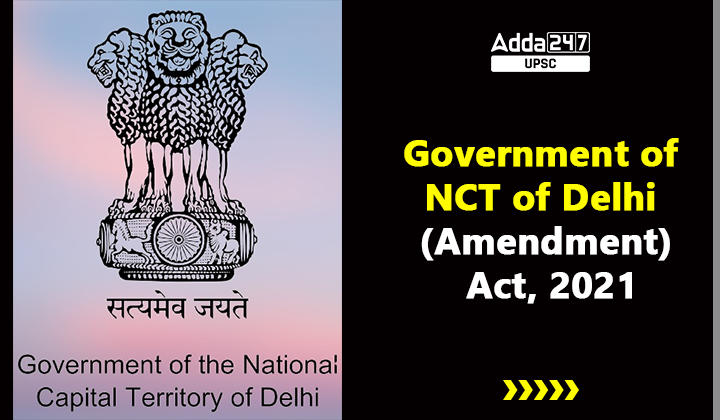Table of Contents
Government of NCT of Delhi (Amendment) Act 2021
- The Act increases the authority of the Lieutenant Governor (LG) in Delhi, diminishing the influence of the elected government.
- It aims to provide more clarity on specific matters mentioned in the Government of National Capital Territory of Delhi Act, 1991.
- The legislative measure amends the Government of National Territory of Delhi Act, 1991, reallocating power to the LG in certain aspects while maintaining the accountability of the Delhi Legislative Assembly.
- The Act’s main goals include eliminating the existing confusion about what needs to be submitted to the LG before orders can be issued and defining the roles and responsibilities of the elected government and the Lieutenant Governor (LG) in Delhi.
Need of Government of NCT of Delhi (Amendment) Act 2021
In the “objects and reasons” provided, the government highlights two key issues. Firstly, there is a lack of a structured mechanism to ensure the timely execution of Section 44 of the 1991 Act. Moreover, there is a lack of clarity regarding which matters need to be presented to the LG before implementation.
Furthermore, the government also notes in the “objects and reasons” that this amendment is intended to align with the interpretation put forth by the Supreme Court in the case of the Government of NCT of Delhi vs. the Union of India.
Background of Government of NCT of Delhi (Amendment) Act 2021
- In 1991, Delhi gained a fully elected legislative assembly and a responsible government through a constitutional amendment.
- The 69th Constitutional Amendment Act of 1991 granted special status to the Union Territory of Delhi, renaming it the ‘National Capital Territory of
- Delhi’ and designating its administrator as the Lieutenant Governor (LG).
- Despite being a Union Territory, Delhi received special constitutional recognition by the Parliament.
- The 1991 act established a fully elected assembly and a council of ministers accountable to the assembly.
- The assembly had the authority to legislate on all matters in the state and concurrent lists, except for land, police, and public order. However, laws passed by Parliament took precedence over those enacted by the Delhi Assembly.
- The act also incorporated a provision from the Government of Union Territories Act, 1963, which allowed the LG to refer differences with the council of ministers to the President for resolution. During this period, the LG could take actions as deemed appropriate.
- The Supreme Court ruled that the government did not need to seek the LG’s concurrence on its decisions, and differences between them should be resolved considering the constitutional importance of representative government and cooperative federalism.
- The verdict established that the LG was bound by the advice of the council of ministers, and the council’s decisions should be communicated to the LG.
- However, the SC emphasized that the LG couldn’t mechanically or mindlessly refer matters and should attempt to resolve differences within the framework of the law and Transaction of Business Rules.
- In response to the verdict, the state government ceased sending files on executive matters to the LG before implementation, but still kept the LG informed of administrative developments.
- These historical circumstances provide the context for the new amendments introduced.
Provision for Government of NCT of Delhi (Amendment) Act, 2021
Here are some key provisions of the Government of NCT of Delhi (Amendment) Act, 2021:
- In any law passed by the Delhi legislative assembly, the term ‘government’ now explicitly refers to the Lieutenant Governor (LG). The Act formally defines ‘government’ as the LG.
- The Act grants discretionary powers to the LG, even in areas where the Legislative Assembly has the authority to make laws.
- A new clause introduced to Section 44 of the 1991 Act mandates that the government must seek the LG’s opinion on all matters before taking any executive action. This ensures accountability and requires the state government or cabinet to consult the LG before implementing any decision.
- The amendment also specifies that the Legislative Assembly cannot create rules that would enable it to delve into day-to-day administration matters of the Capital or conduct inquiries related to administrative decisions.
| Relatable Article | |
| Drug Price Control Order 2013 | Information Technology Act 2000 |
| Poshan Abhiyaan | Direct Tax Vivad se Vishwas Act 2020 |



 TSPSC Group 1 Question Paper 2024, Downl...
TSPSC Group 1 Question Paper 2024, Downl...
 TSPSC Group 1 Answer key 2024 Out, Downl...
TSPSC Group 1 Answer key 2024 Out, Downl...
 Cabinet Ministers of India 2024, New Cab...
Cabinet Ministers of India 2024, New Cab...







